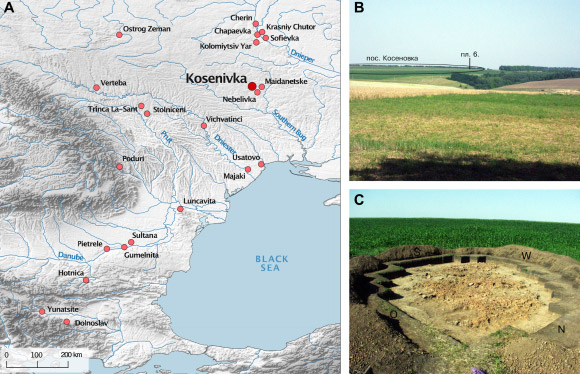In a new study published in the journal PLoS ONE, archaeologists examined the exceptional human remains from the Middle Trypillia site of Kosenivka (ca. 3700-3600 BCE) in Ukraine.
The Trypillia culture is a Neolithic European culture that arose in Ukraine between the Seret and Bug rivers, with extensions south into modern-day Romania and Moldova and east to the Dnieper River, in the 5th millennium BCE.
Also known as the Cucuteni-Trypillia culture, it is characterized by advanced agriculture, developed metallurgy, pottery-making, sophisticated architecture and social organization.
Trypillian society was matriarchal, with women heading the household, doing agricultural work, and manufacturing pottery, textiles and clothing.
Hunting, keeping domestic animals and making tools were the responsibilities of the men.
“Despite the vast number of artifacts the Trypillia left behind, archeologists have found very few human remains,” said Dr. Katharina Fuchs from Kiel University and her colleagues.
“Due to this absence, many facets of the lives of this ancient people are still undiscovered.”
The researchers studied a settlement of the Trypillia culture near Kosenivka, Ukraine.
Comprised of several houses, this site is unique for the presence of human remains.
The 50 human bone fragments recovered among the remains of a house stem from at least seven individuals — children, adults, males and a female, perhaps once inhabitants of the house. The remains of four of the individuals were also heavily burnt.
By analyzing the carbon and nitrogen present in the bones, as well as in grains and the remains of animals found at the site, the researchers determined meat made up less than 10% of the inhabitants’ diets.
This is in line with teeth found at the site, which have wear marks that indicate chewing on grains and other plant fibers.
That Trypillia diets consisted mostly of plants supports theories that cattle in these cultures were primarily used for manuring the…
Read the full article here

